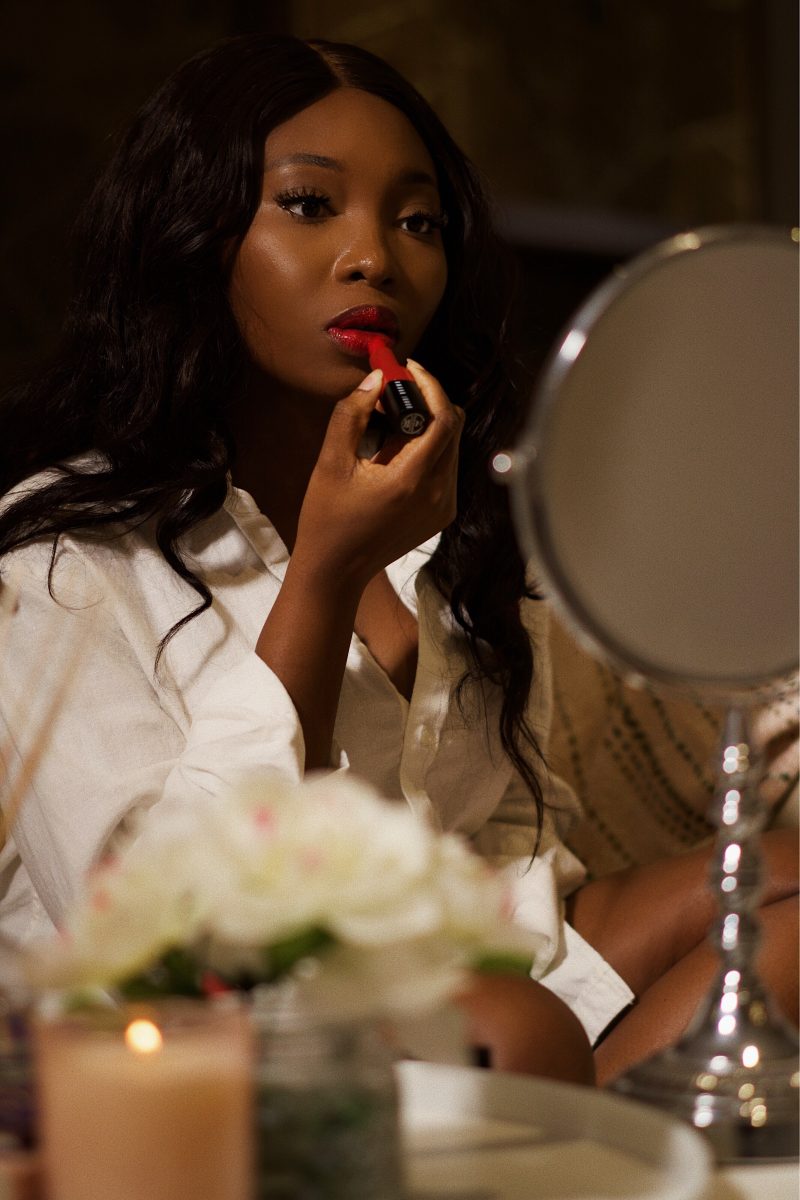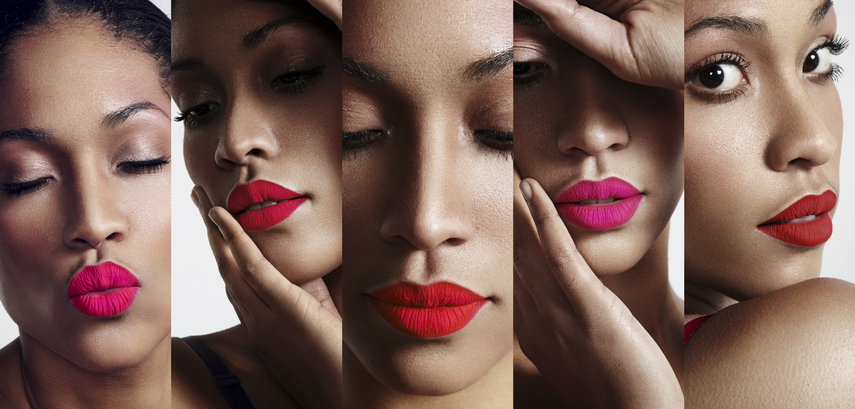
Source: Alma Rex-Ezonfade / Alma Rex-Ezonfade
As Black women decolonize their minds from the grips of white supremacy, sisters are reclaiming one specific beauty staple that has been deemed a source of empowerment and sexual freedom for white women.
In all of its boldness, red lipstick is an act of resistance when worn by Black women. The attribution of why sisters wouldn’t wear the color has been rooted in religious dogma, racism and historical trauma.
It’s a lot. I know.
In Ancient Egypt, red lipstick and the ability to have it was assigned to social status. The color was reserved for the upper echelon of the Egyptian peoples– though everyone wore cosmetics. Queens Cleopatra VII and Nefertiti were documented as red lipstick wearers. It was an integral part of Egyptian society as it determined a person’s place within that society.
A long-standing axiom in our community regarding the wear of red lipstick—especially if sisters grew up in devout Christian homes— is that it’s for whores and unsavory women. The theory handed down through generations of Black households stemmed from Puritanical principles. Puritans believed any cosmetic enhancement was the devil’s work, and they also thought that women who wore the daring hue were witches sent to lure their raggedy-ass men into marriage.
To add another layer of complexity–enslaved West Africans were brought to the United States with their cultural custom of adornment and beautifying themselves from head to toe and you have the antithesis of staunch, uptight white Puritans. The latter deemed those traditions as primitive and ugly.
Enslavers and colonizers did a bang-up job by indoctrinating Black people with their uber-conservative religious beliefs. And it is common knowledge in African American communities that elder Black women—particularly those who were slaves to the church—adopted those ideals and ran with them in the most abusive ways. They doubled down on the far-fetched idea that attributed red lipstick wearers to loose, unsaved, street women. The assignment stuck. Remnants of yesteryear’s views are still prevalent in the Black church today.
Add the racist white trope of the jezebel with crimson lips on melanin-dripped skin and white supremacists’ egregious caricatures of the Black aesthetic. Black women resigned themselves from the standout hue. Slavery-era stereotypes of Black women with dark skin, uber-white teeth, voluptuous young bodies, big red lips, and hypersexualized didn’t help.
According to a report by Ferris State University, the jezebel was “portrayed as overtly sexual, and she used her ‘feminine wiles’ to deceive the formerly good white man,” according to a report by Ferris State University.
Of course, the standard of hyper-sexualizing and relegating Black women’s bodies to white mens’ desires chapped the asses of the Black woman’s greatest adversary– white women.
As they got tired of their men oppressing them, they took a stand demanding the right to vote. The birth of the suffrage movement pushed red lipstick into the limelight for those alabaster ladies who wanted to take an undaunted stance against patriarchal oppression. In the early 20th century, Suffragettes used the cosmetic accessory as a tool of empowerment.
Gabriela Hernandez, a cosmetics historian and founder of a makeup brand, expounded on the phenomena to Teen Vogue last year, “In order to gain more notoriety and attention to their cause, some ladies would wear lipstick to their public events. This was seen as the mark of the independent, emancipated woman, which at the time was thought to be quite scandalous.”
Black women were not included in that assertion. A 2019 article from Education Post examined when the tables turned even further for Black women.
“Black folks and Northern White women were political allies. However, there were no coalitions between Black folks and White men, especially white women in the conservative South. Southern White women were active participants in the enslavement, disenfranchisement and dehumanizing of Black folks. Some records show that up to 30% of slave owners were White women. Additionally, after the Civil War, White women were full participants in the KKK, lynching Black men.”
In layman’s terms, we might be white women, but we ain’t niggas.
Continuing in the vein of treacherous white women, Black women had to contend with ridiculous amounts of envy from broads who realized their husbands (enslavers) would rather rape enslaved Black women than sleep with their actual wives.
Scholar Stephanie E. Jones- Rogers (author of “They Were Her Property”), in an interview with The Undefeated, explained the dynamic between the two groups of women at the time.
“So pro-slavery apologists, who are refuting negative views of slavery, are saying, ‘Oh, no. Look at what white women do. White women are caring for these enslaved people like their children.’ That image has stuck.”
“Except for one really important exception, and that’s the Jealous Mistress: the white woman who lives in the house and learns that her husband is having sex with an enslaved woman and she lashes out violently at that woman because she can’t lash out violently at her husband because of patriarchy.”
Now add present-day fetishization of the Black woman’s aesthetic by wafer-lipped pale women and anti-Black negroes like rapper ASAP Rocky– and you’ll find sisters at the intersection of “Hi, Hater” and Latrell Spencer from White Chicks.
Former soap opera star Lisa Rinna, known for her notorious soup coolers made with fillers, has made a living receiving praise for a feature she bought that Black women have been demonized for throughout history.
In 2013, Harlem-raised ASAP Rocky parted his ashy bembas to say that red lipstick wasn’t a thing for dark-skinned women.
“But for real, for me, I feel like with the red lipstick thing it all depends on the pair of complexion,” he opined. “I’m just being for real. You have to be fair-skinned to get away with that.”
First of all, nobody asked him. Second, we all know what he meant by “fair-skinned.”
After the internets flamed him, he backpedaled with a half-assed non-apology.
“Black girls just, ah man, went crazy. They just took it how they took it. This is actually my second time talking about it cause I really don’t really look at it as an issue. If people get upset at that I think it’s petty at the same time. It’s like they damn near wanna Rick Ross boycott me right now, over some lipstick controversy.”
“Black girls, you know how sensitive they are, but they our sisters, man. It is what is man. I come from a black home, so I know how sensitive black women can be,” he continued. “Especially when you talking about they looks or something like that.”
“You can’t say nothing about they glasses, they nails, none of that because then you’re a womanizer or you’re a racist. I don’t know how I’m going to be racist. I have to wake up and look at my black ass in the mirror every day. It’s like, what are you talking about? But it is what it is, man. I’m proud to be black.”
ASAP wasn’t the only person playing overseer with respect to Black women’s beauty.
In 2016, MAC Cosmetics posted a gorgeous photo of dark-skinned Black women with deep berry-stained lips in an attempt to celebrate the model’s luscious lips during Fashion Week.

Source: pinkypills/Fuse / Getty
The cosmetic conglomerate had to delete the photo because of the amount of hate it received “within minutes” of posting.
In 2018, Rep. Ayanna Pressley’s acknowledgment of wearing braids and a red lip during her victory speech was a testimony of resisting.
Pressley challenged the status quo, specifically regarding her ability to appeal to a broader audience (non-Black folks) while dripping Black Girl Magic, saying, “Is your appeal broad enough? Are you playing identity politics?”
She continued, “Can a congresswoman wear her hair in braids, rock a black leather jacket and a bold red lip?”
During her campaign and in her current position, Pressley’s clothing, makeup and hairstyle choices were weaponized and politicized. She shut it down.
When a Black woman opts to wear red lipstick, she empowers herself and consciously defecates on her oppressors– the purveyors of white supremacy. Black women don’t have to ask permission to be seen or step on necks– especially when everyone and their mama consistently ask them to do their work.
They own their humanity and take back what’s lived suppressed in their DNA for over half a century– swag.
So yeah, Sis. Rock the brightest, boldest, baddest shade of red lipstick loudly and proudly. Let ‘em know who you are.



